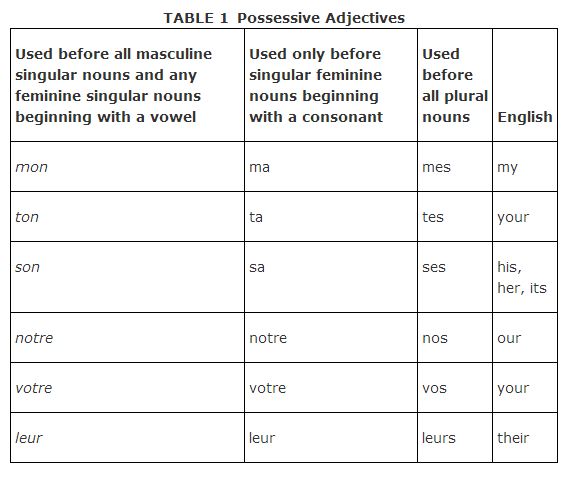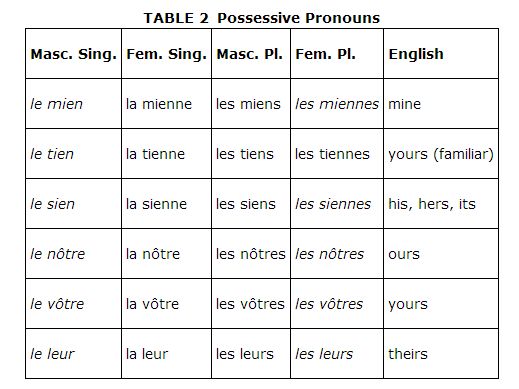Possession, Possessive Pronouns
In English we may use an apostrophe and an ‐s to show that something belongs to someone. In French, however, because an apostrophe is only used to replace a letter that is omitted due to elision, 's is not used to show possession. French uses a different word order than the one we are accustomed to, and possessive adjectives and pronouns also follow a different set of rules.
The preposition de (of) is used to express relationship and possession. If the sentence requires de and has two or more nouns, de (or d' before a vowel) is repeated before each noun. De contracts with the definite article le to become du or with les to become des in order to express “of the”:
- C'est la voiture du père de Jean. (It's John's father's car.)
- C'est la maison de Lucien et de Sylvie. (It's Lucien and Sylvie's house.)
- Ce sont les enfants des Renaud. (They are the Renauds' children.)
Although de can be used to demonstrate possession of a person or a thing, the idiom être à (to belong to) is usually used to show possession of a thing (not a person). Conjugate être to agree with the subject, and if the sentence contains two or more nouns, repeat the preposition à before each noun:
- À qui est ce livre? Ce livre est à Roger. (Whose book is this? This is Roger's book.)
- À qui sont ces CDs? Ces CDs sont à Anne et à Luc. (Whose CDs are these? These CDs are Anne's and Luke's.)
Like all French adjectives, possessive adjectives agree in gender and number with the nouns they modify (the person or item that is possessed) and not with the subject (the person possessing them).
- Claude est mon frère et Anne est mon amie. (Claude is my brother, and Anne is my friend.)
- Il travaille avec sa mère et son père. (He works with his mother and father.)
- Elle aide sa tante et son oncle. (She helps her aunt and uncle.)
- Les Leduc aiment leurs enfants et leur chien. (The Leducs love their children and their dog.)
Possessive pronouns are used to replace a possessive adjective + a noun. The pronoun must agree in number and gender with the noun it replaces. Definite articles contract with the prepositions à and de when used before a possessive pronoun. Use Tables and to select the appropriate possessive pronoun.

